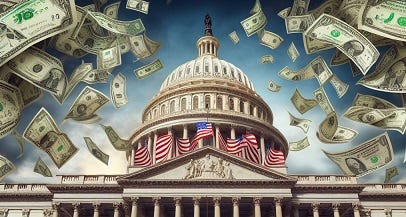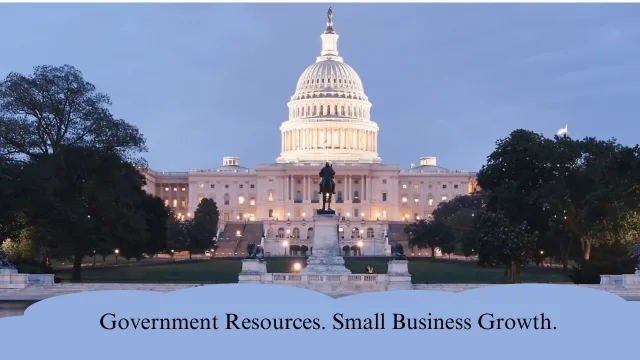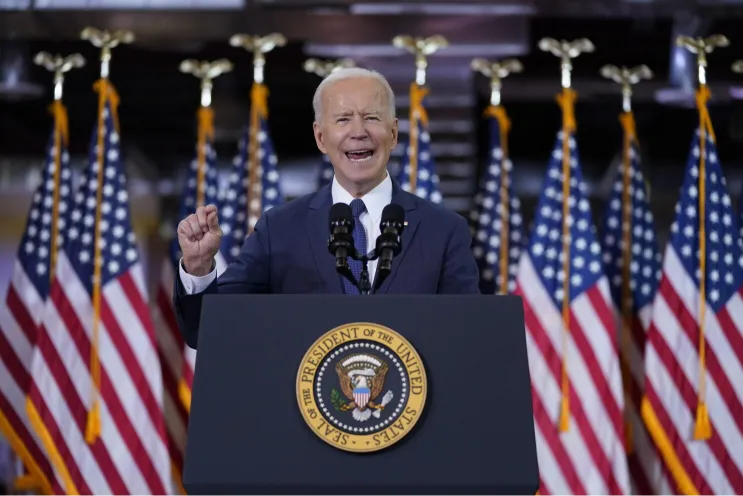trending
neon
Cirque du Soleil offers summer ticket deals
dining out
Celebs ditch the Strip for iconic Henderson restaurant
july 
trending
neon
Cirque du Soleil offers summer ticket deals
dining out
Celebs ditch the Strip for iconic Henderson restaurant
july 

The U.S. government plays a key role in shaping investment strategies through regulatory frameworks, fiscal policies, and incentives. Explore how these factors impact business decisions and investment trends




The U.S. government has a profound influence on the nation’s investment landscape, with policies that guide, regulate, and incentivize both domestic and international investments. From tax reforms to trade policies and regulatory frameworks, government actions help shape the investment strategies of businesses, institutional investors, and individuals alike. Understanding the government's role is crucial for anyone looking to navigate the U.S. investment environment and optimize investment decisions for growth, profitability, and sustainability.
The U.S. government establishes a comprehensive regulatory environment to ensure the stability, transparency, and fairness of financial markets. These regulations affect everything from securities trading to corporate governance, shaping how investments are made.
The SEC plays a vital role in protecting investors and maintaining fair, orderly, and efficient markets. By enforcing regulations around securities trading, reporting requirements, and corporate disclosures, the SEC ensures that companies are transparent in their dealings, thus reducing risks for investors.
The U.S. Federal Reserve has a significant role in shaping investment strategies through its control of monetary policy. The Fed influences interest rates, inflation, and liquidity in the economy, which in turn impacts the returns on investments.
The U.S. government’s fiscal policies, particularly tax reforms, play a significant role in influencing investment strategies. By offering tax breaks, credits, and incentives, the government encourages businesses and individuals to invest in specific sectors and projects.
Tax cuts, such as those introduced under the Tax Cuts and Jobs Act (TCJA) of 2017, lower corporate tax rates, making the U.S. a more attractive destination for both domestic and foreign investment. The reduced tax burden on businesses allows companies to reinvest their savings into operations, growth initiatives, and expansion efforts.
The government encourages individual investment through tax-advantaged accounts like 401(k)s, IRAs, and Health Savings Accounts (HSAs). These vehicles allow investors to defer taxes on their earnings, which can compound over time, leading to higher returns in the long term.
The U.S. government’s trade policies have a significant impact on investment strategies, particularly for businesses engaged in global markets. Trade agreements, tariffs, and foreign investment policies dictate the flow of capital and goods between the U.S. and its trading partners.
Trade agreements such as the United States-Mexico-Canada Agreement (USMCA) and previous agreements like the Trans-Pacific Partnership (TPP) (before the U.S. withdrawal) enhance access to foreign markets and encourage businesses to invest in international expansion.
The U.S. government actively encourages foreign direct investment (FDI) through policies that make it easier for foreign investors to establish businesses or acquire U.S.-based companies.
In times of economic downturn, such as during the COVID-19 pandemic, the U.S. government plays a crucial role in supporting business and investment activity through stimulus packages and recovery plans. These interventions help stabilize the economy and provide businesses with the capital needed to weather financial challenges.
The government uses stimulus packages to inject capital into the economy, either directly through checks to individuals or through business loans and grants.
Government policies supporting infrastructure investments, such as the Bipartisan Infrastructure Law, stimulate economic growth by providing capital for the construction and upgrade of national infrastructure systems. This leads to job creation, increased demand for goods and services, and opportunities for investors in sectors like construction, transportation, and technology.
The U.S. government is also focusing on sustainable investments and innovation, with policies that encourage businesses to align with environmental, social, and governance (ESG) principles. These policies shape long-term investment strategies and open up new opportunities for growth.
Policies that promote renewable energy, clean technology, and carbon reduction are transforming the investment landscape.
The U.S. government plays a key role in shaping investment strategies through regulatory frameworks, fiscal policies, and incentives. Explore how these factors impact business decisions and investment trends
the latest

Mergers and Acquisitions Surge in U.S. Despite Economic Uncertainty
Despite economic challenges, mergers and acquisitions (M&As) in the U.S. business sector have surged. Companies are leveraging strategic deals to enhance market presence, expand operations, and drive growth in a volatile economic landscape

U.S. Companies Respond to Labor Shortages with Automation and Technology
As labor shortages continue to impact various industries, U.S. companies are accelerating the adoption of automation and technology. From AI-driven customer service to robotic manufacturing, businesses are leveraging innovative solutions to maintain productivity and efficiency

Stock Buybacks and the Impact on Corporate Investments in the U.S.
Stock buybacks have become a dominant strategy for U.S. corporations, influencing investment decisions, shareholder returns, and economic growth. While buybacks boost stock prices and reward investors, critics argue they divert funds from research, expansion, and employee wages

Small Business Investment: Government Initiatives to Drive Growth
The U.S. government has launched new initiatives to increase investment in small businesses, aiming to drive economic growth and innovation. These policies include tax incentives, grants, and funding programs designed to support entrepreneurs and startups

Venture Capital Investment in Startups Reaches New Heights in 2025
Venture capital investment in startups has surged to unprecedented levels in 2025, fueling innovation across various industries. With increased funding, early-stage companies are experiencing rapid growth, particularly in technology, healthcare, and green energy sectors

Corporate America Faces Challenges Amid Global Supply Chain Disruptions
Global supply chain disruptions continue to challenge Corporate America, affecting production, pricing, and consumer demand. As businesses navigate logistical bottlenecks, rising costs, and geopolitical tensions, the U.S. economy faces significant hurdles in maintaining stability and growth

Biden Administration Unveils New Infrastructure Investment Plan
The Biden administration has announced a comprehensive infrastructure investment plan aimed at revitalizing America's transportation, energy, and water systems. This article provides key insights into the plan's objectives, funding allocations, and anticipated impacts on the nation's economy and communities

Understanding U.S. Investment Policies and Their Impact
Explore how U.S. investment policies shape financial markets, economic growth, and business strategies, offering both opportunities and challenges for investors

The Link Between U.S. Investment Policies and Economic Growth
Recent U.S. investment policies are driving economic growth, influencing global markets, trade, and financial stability. This article explores their impact on businesses and investors